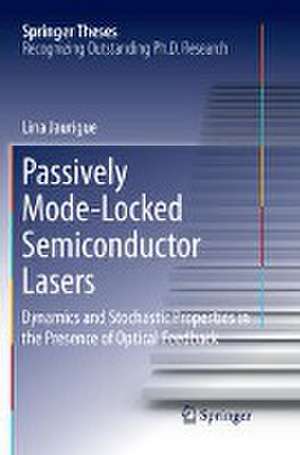Passively Mode-Locked Semiconductor Lasers: Dynamics and Stochastic Properties in the Presence of Optical Feedback: Springer Theses
Autor Lina Jaurigueen Limba Engleză Paperback – 4 aug 2018
| Toate formatele și edițiile | Preț | Express |
|---|---|---|
| Paperback (1) | 636.30 lei 6-8 săpt. | |
| Springer International Publishing – 4 aug 2018 | 636.30 lei 6-8 săpt. | |
| Hardback (1) | 642.51 lei 6-8 săpt. | |
| Springer International Publishing – 4 iul 2017 | 642.51 lei 6-8 săpt. |
Din seria Springer Theses
- 18%
 Preț: 997.88 lei
Preț: 997.88 lei -
 Preț: 389.88 lei
Preț: 389.88 lei - 15%
 Preț: 646.94 lei
Preț: 646.94 lei - 18%
 Preț: 943.43 lei
Preț: 943.43 lei -
 Preț: 399.29 lei
Preț: 399.29 lei - 18%
 Preț: 944.99 lei
Preț: 944.99 lei - 15%
 Preț: 636.80 lei
Preț: 636.80 lei - 18%
 Preț: 941.05 lei
Preț: 941.05 lei - 15%
 Preț: 643.16 lei
Preț: 643.16 lei - 15%
 Preț: 642.68 lei
Preț: 642.68 lei - 18%
 Preț: 1103.62 lei
Preț: 1103.62 lei - 20%
 Preț: 558.82 lei
Preț: 558.82 lei - 18%
 Preț: 1112.30 lei
Preț: 1112.30 lei - 18%
 Preț: 944.19 lei
Preț: 944.19 lei - 18%
 Preț: 1109.92 lei
Preț: 1109.92 lei - 18%
 Preț: 1217.27 lei
Preț: 1217.27 lei - 15%
 Preț: 640.06 lei
Preț: 640.06 lei - 15%
 Preț: 636.45 lei
Preț: 636.45 lei - 15%
 Preț: 640.06 lei
Preț: 640.06 lei - 15%
 Preț: 640.88 lei
Preț: 640.88 lei -
 Preț: 389.70 lei
Preț: 389.70 lei - 20%
 Preț: 563.89 lei
Preț: 563.89 lei -
 Preț: 393.35 lei
Preț: 393.35 lei - 15%
 Preț: 637.93 lei
Preț: 637.93 lei - 15%
 Preț: 641.85 lei
Preț: 641.85 lei - 18%
 Preț: 1225.94 lei
Preț: 1225.94 lei - 20%
 Preț: 551.36 lei
Preț: 551.36 lei - 18%
 Preț: 1229.10 lei
Preț: 1229.10 lei - 15%
 Preț: 639.25 lei
Preț: 639.25 lei - 18%
 Preț: 999.45 lei
Preț: 999.45 lei - 15%
 Preț: 640.06 lei
Preț: 640.06 lei - 18%
 Preț: 1220.45 lei
Preț: 1220.45 lei - 18%
 Preț: 1116.26 lei
Preț: 1116.26 lei - 18%
 Preț: 1110.72 lei
Preț: 1110.72 lei - 18%
 Preț: 1000.87 lei
Preț: 1000.87 lei - 18%
 Preț: 891.17 lei
Preț: 891.17 lei - 15%
 Preț: 640.06 lei
Preț: 640.06 lei - 5%
 Preț: 1154.07 lei
Preț: 1154.07 lei - 15%
 Preț: 635.96 lei
Preț: 635.96 lei - 15%
 Preț: 640.88 lei
Preț: 640.88 lei -
 Preț: 387.20 lei
Preț: 387.20 lei - 18%
 Preț: 1109.92 lei
Preț: 1109.92 lei -
 Preț: 385.25 lei
Preț: 385.25 lei -
 Preț: 385.25 lei
Preț: 385.25 lei - 18%
 Preț: 1112.30 lei
Preț: 1112.30 lei - 18%
 Preț: 999.45 lei
Preț: 999.45 lei -
 Preț: 386.99 lei
Preț: 386.99 lei - 15%
 Preț: 637.13 lei
Preț: 637.13 lei - 20%
 Preț: 554.20 lei
Preț: 554.20 lei - 20%
 Preț: 555.57 lei
Preț: 555.57 lei
Preț: 636.30 lei
Preț vechi: 748.59 lei
-15% Nou
Puncte Express: 954
Preț estimativ în valută:
121.76€ • 127.44$ • 101.34£
121.76€ • 127.44$ • 101.34£
Carte tipărită la comandă
Livrare economică 31 martie-14 aprilie
Preluare comenzi: 021 569.72.76
Specificații
ISBN-13: 9783319864976
ISBN-10: 3319864971
Ilustrații: XV, 196 p. 133 illus., 53 illus. in color.
Dimensiuni: 155 x 235 mm
Greutate: 0.3 kg
Ediția:Softcover reprint of the original 1st ed. 2017
Editura: Springer International Publishing
Colecția Springer
Seria Springer Theses
Locul publicării:Cham, Switzerland
ISBN-10: 3319864971
Ilustrații: XV, 196 p. 133 illus., 53 illus. in color.
Dimensiuni: 155 x 235 mm
Greutate: 0.3 kg
Ediția:Softcover reprint of the original 1st ed. 2017
Editura: Springer International Publishing
Colecția Springer
Seria Springer Theses
Locul publicării:Cham, Switzerland
Cuprins
Introduction.- Mode-locked Laser Model.- Mode-locked Laser Dynamics.- Timing Jitter of the Mode-locked Laser.- Noise-induced Modulations.- Summary and Outlook.
Notă biografică
Lina Jaurigue received her BSc in physics, mathematics and geophysics in 2009 from Victoria University of Wellington in New Zealand. In 2011 she completed her BSc with First Class Honours in physics and following this her MSc in physics in 2013, both also from the Victoria University of Wellington. In 2013 she started her doctoral studies at the Technische Universität Berlin, which she completed in 2016. Her scientific interests include nonlinear laser dynamics, delay differential equations and quantum transport. She has authored and co-authored 8 peer-reviewed scientific papers.
Textul de pe ultima copertă
This thesis investigates the dynamics of passively mode-locked semiconductor lasers, with a focus on the influence of optical feedback on the noise characteristics. The results presented here are important for improving the performance of passively mode-locked semiconductor lasers and, at the same time, are relevant for understanding delay-systems in general. The semi-analytic results developed are applicable to a broad range of oscillatory systems with time-delayed feedback, making the thesis of relevance to various scientific communities. Passively mode-locked lasers can produce pulse trains and have applications in the contexts of optical clocking, microscopy and optical data communication, among others. Using a system of delay differential equations to model these devices, a combination of numerical and semi-analytic methods is developed and used to characterize this system.
Caracteristici
Nominated as an outstanding PhD thesis by the Technical University Berlin, Berlin, Germany Investigates mode-locked laser dynamics over a wide range of feedback delay times to address the strong influence of the feedback phase for short delay times Also addresses the multi-stability and noise-induced modulations which arise for long feedback delay times Employs a combination of numerical integration, path continuation, and semi-analytic methods Derives a simple formula for the feedback dependence of the timing jitter Includes supplementary material: sn.pub/extras
